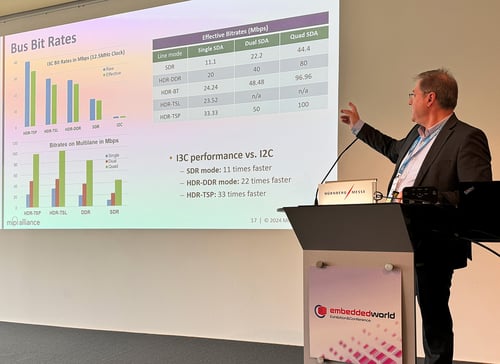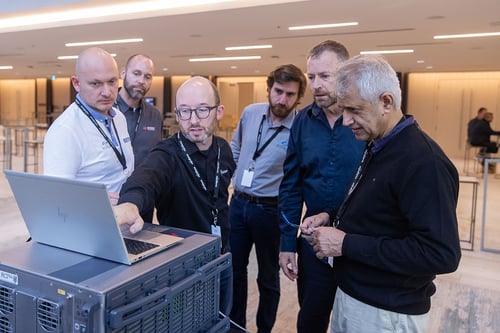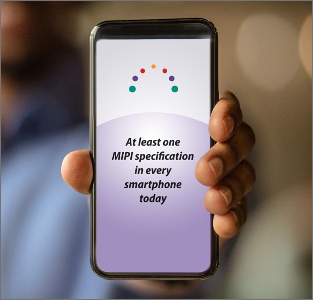4 min read
MIPI Debug Webinar Series: Exploring the Latest Developments with the MIPI Debug Family of Specifications
![]() MIPI Alliance
:
21 October 2024
MIPI Alliance
:
21 October 2024

- Resources
- Webinars & Workshops
MIPI Debug Webinar Series
Debug is an essential part of any development process, and over the past two decades, the MIPI Debug Working Group has developed a rich family of debug specifications that unify the protocols and software layers for debugging ever more highly integrated embedded systems. The family of specifications, which includes MIPI Debug Over I3C℠, MIPI SneakPeek Protocol and many others, reduce development and implementation time, and ensure the interoperability of key hardware and software interfaces.
Presented on 4-5 December 2024, this series of four webinars provides essential information on how to get started with MIPI debug solutions, explains why MIPI is renaming many of its debug specifications, and previews the forthcoming MIPI security specification for debug and MIPI Debug Over UCIe.
Sessions and Presenters
How to Get Started with MIPI Debug Solutions
Presenter: Enrico Carrieri
Aimed at engineers who would like to get started with MIPI debug solutions, this session introduces the MIPI debug working group's charter (scope of work) and explains the current focus areas of the group, which includes the development of the MIPI security specification for debug and MIPI debug over UCIe specification (both of which have their own dedicated sessions within the webinar series). After this introduction, the session provides an overview of the approach the working group has taken to develop an overarching MIPI debug system framework, explaining how the framework breaks down modern system-on-chip (SoC) debug architectures into manageable debug subsystems by applying a layering approach to the debug system stack. The session concludes with a brief introduction to all of the current debug specifications and provide a brief preview of upcoming specifications.
Presenter
-
Enrico Carrieri
 Chair of the MIPI Debug Working Group
Chair of the MIPI Debug Working GroupEnrico is a senior principal engineer at Intel Corporation, where he owns the corporate strategy and architectures for debug interfaces and observation solutions. He has chaired the MIPI Debug Working Group for over eight years and has participated in the authoring of many specifications, including MIPI SneakPeek Protocol and MIPI Debug Over I3C. Enrico is also a frequent contributor to the MIPI Alliance blog, providing technical insights into MIPI debug specifications.
A Preview of the MIPI Security Specification for Debug
Presenter: Jason Kirschenbaum
Debug is a critical feature of any system, and debug capabilities, if not properly protected, could potentially be used by adversaries to gain access to cryptographic keys, private data and other sensitive assets. To support the need to protect debug and trace features, a new MIPI security specification, targeted for release in 2025, will add an optional security layer to the MIPI "Debug Over" family of specifications.
This presentation provides a preview of the forthcoming MIPI security specification for debug and explains the approach taken within the MIPI debug architecture to add a security layer. It explains what is in (and out) of scope of the security layer, covering requirements for secure session management, key negotiation (leveraging recommended industry standards), message encryption and authentication, and secure message formats. It also covers how the forthcoming security specification for debug follows a similar approach to the recently adopted MIPI Camera Security Framework by leveraging the DMTF’s Security Protocols and Data Models (SPDM) specification as its basis.
Presenter
-
Jason Kirschenbaum
 Technical Contributor to MIPI Security Specification for Debug, and Technical Lead, Intel Corporation
Technical Contributor to MIPI Security Specification for Debug, and Technical Lead, Intel CorporationJason is a debug tools engineer at Intel Corporation and member of the MIPI Debug Working Group. Jason has a decade of experience in debug tools software development. Within MIPI, he has worked on the MIPI Security Specification for Debug.
Introducing the MIPI "Debug Over" Family of Specifications
Presenter: Enrico Carrieri
In 2024, MIPI began to transition the names of several longstanding MIPI debug specifications to create a new family of “MIPI Debug Over” (MDO) specifications. MIPI Debug Over I3C® was the first of the debug interfaces to officially make this transition, and several other existing debug specifications will transition to the new naming scheme in their next updates.
This webinar introduces the "MIPI Debug Over" (MDO) family of specifications, explaining why MIPI has chosen to move away from the speed-centric “Gigabit Debug”-type naming schemes of the past. The chair of the Debug Working Group also takes a deep dive into the new family of MDO specifications, explaining how they are based on a common layered stack architecture that enables a flexible underlying debug infrastructure that can be transmitted over different transports links, providing scalability and ease of adoption. In addition, the session highlights the use of existing transports links supported by the MDO specifications today (including USB and I3C) and previews upcoming new links (such as PCIe and UCIe) that will be added to the MDO family in the near future.
Presenter
-
Enrico Carrieri
 Chair of the MIPI Debug Working Group
Chair of the MIPI Debug Working Group
Enrico is a senior principal engineer at Intel Corporation, where he owns the corporate strategy and architectures for debug interfaces and observation solutions. He has chaired the MIPI Debug Working Group for over eight years and has participated in the authoring of many specifications, including MIPI SneakPeek Protocol and MIPI Debug Over I3C. Enrico is also a frequent contributor to the MIPI Alliance blog, providing technical insights into MIPI debug specifications.
A Preview of MIPI Debug Over UCIe
Presenters: Aruni Nelson and Peter Onufryk
UCIe™ (Universal Chiplet Interconnect Express™) is an open specification that defines the interconnect between chiplets within a System-In-Package (SiP), enabling an open chiplet ecosystem and ubiquitous interconnect at the package level.
To support this initiative, MIPI will extend its MIPI "Debug Over" family of specifications to include the UCIe transport. Targeted for completion in 2026, the new specification will enable the debugging of UCIe chiplets that are addressable over a UCIe-based topology within a SiP. The specification will leverage UCIe defined Management Transport infrastructure for debugging UCIe chiplets using MIPI defined standard debug protocols such as MIPI SneakPeek Protocol (SPP℠), MIPI System Trace Protocol (STP℠), and MIPI Trace Wrapper Protocol (TWP℠).
This presentation provides a preview of the forthcoming specification, explaining how it will support debug over UCIe in various Debug and Test System (DTS) and Target System (TS) configurations. It covers the detection, configuration, and collection of debug data from the UCIe chiplets in a SiP.
Presenters
-
Aruni Nelson
 Aruni Nelson, Technical Lead for MIPI Debug Over UCIe Specification
Aruni Nelson, Technical Lead for MIPI Debug Over UCIe Specification Aruni Nelson, principal engineer for Intel Corporation, is serving as technical lead for the MIPI Debug Over UCIe Specification. She also serves as co-vice chair of the MIPI I3C Working Group.
-
Peter Onufryk
 Chair of the UCIe Manageability & Security Working Group, and Fellow, Intel Corporation
Chair of the UCIe Manageability & Security Working Group, and Fellow, Intel CorporationPeter is an Intel Fellow in the Datacenter and AI Silicon Engineering Group at Intel. He has been active in NVMe standardization and was a co-founder of the UCIe Consortium. Peter holds over 40 patents and has written several articles and books. Before Intel, he was a Fellow in the Data Center Solutions business unit at Microchip responsible for data center product architecture. He was previously Director of Engineering at Integrated Device Technology (IDT) and a research staff member at AT&T Bell Labs. Peter earned a Ph.D. in Electrical and Computer Engineering from Rutgers University and an MSEE from Purdue University.






